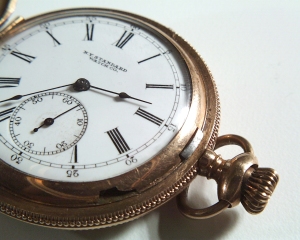In one of my first posts I mentioned that we sleep later now that we’re living in Spain. That’s certainly what the clock says, but it turns out that we’re not sleeping as late as I had supposed.
If you look at a map of Europe, you’ll see that we’re pretty much due south of England. In fact, Valencia is actually a little bit west of a line drawn directly south from Greenwich, England, the Greenwich from which all earthly time is reckoned (cue Rule Britannia played by a brass band).
Lining up as we do longitudinally, you’d think that we’d be in the same time zone. But in fact Spain is in the Central European Time zone (all of us in yellow on the map), along with countries as far east as Poland. That’s at least 1100 miles east of us, and we’re on the eastern coast of Spain. It’s even more of an issue for someplace in western Spain like Cape Finisterre (westernmost tip of Spain, name deriving from the Latin finis terrae, meaning “end of the earth”). It’s nearly 600 miles west of us.
From one end to the other, that’s one ridiculously wide time zone (roughly the distance from Boston to Denver). Since the width of a time zone ordinarily corresponds to 15 degrees of longitude (which is a different distance depending on your latitude*), around here that should mean that our time zone would be something less than 675 miles wide, rather than the 1700 miles or so that it is (2735 kilometers, for those keeping track).
Though this is the only unusual time zone situation I’ve experienced personally, it’s by no means the strangest one around. Consider China, all in a single time zone. China is 5026 kilometers wide (3123 miles) which should by rights entitle the country to a free set of 5 time zones. So when the sun is rising in easternmost Heilongjiang, clocks say the same thing in Xinjiang, but those folks won’t be hearing roosters for another 5 hours.
Think of the havoc that a huge time zone plays with people who want to be able to squint up at the sun and estimate what time it is. I guess if they’ve been squinting long enough in the same place they’ll have learned to make adjustments. But woe be unto newly arrived squinters trying to show off. The whole situation is fraught with peril.
 I think we’re going to have to leave China up to its own devices, and turn our attention back to Spain. How did this time zone state of affairs come to be, and what are its practical implications?
I think we’re going to have to leave China up to its own devices, and turn our attention back to Spain. How did this time zone state of affairs come to be, and what are its practical implications?
For the answer to the first question we go back more than 7 decades, to the autumn of 1940, and a visit from Hitler to Spain’s fascist dictator Generalissimo Franco. In response to Hitler’s overtures, Franco decided to demonstrate his solidarity with the Führer by shifting Spanish clocks forward an hour so that Spain’s time aligned with that of Nazi Germany.
In practical terms, what does this mean? Well, we’re not faced with the extremes that China sees with every sunrise, but it does mean that when the sun is rising at 6 am some 1100 miles east in Poland, it’s 6 am here, too, though our sunrise is still 2 hours away. Correspondingly, The sun may have set in that Polish border town at 8 pm, but I’ve still got 2 hours of daylight left by which to look at my watch and see the hands move around and around. No wonder Spaniards eat dinner at 9 pm or later!
There is an organized movement called the Association for the Rationalization of Spanish Schedules, and it has been agitating for change. I won’t go into all the issues, but people have strong opinions, and they seem to be making progress. The NPR piece I read from late November 2013 said that a parliamentary committee had approved the association’s proposal to change to Greenwich Mean Time, and that the full legislature would be meeting to decide soon. But we’re in April already, and while I am a foreigner, and likely to be ill-informed, I’ve got Spanish friends, and I think they would have told me if our time zone had shifted. What’s more, El Guapo would be early to teach his classes. What does this no-news mean? Maybe the legislature hasn’t taken the matter up yet. Maybe they were all up too late, and found it hard to get out of bed in the morning. I can sympathize. Whatever the case, we’re still somewhat in the dark.
*(I’m told that at the equator a degree of longitude is 69.1722 miles wide, and that to find the distance at other latitudes, you find the cosine of the latitude and multiply it by 69.1722. I haven’t really been on speaking terms with cosines since college, so I can neither confirm nor deny this, but there are calculators out there that will venture a guess for you about your own latitude/longitude situation, if you will but google.)



Who would have thought time zones would be such an interesting topic? Thanks for the historical background. We were in Spain for about 3 weeks over a decade ago, but I think we were too jet-lagged to notice (and maybe the duration of our stay too short). The archives we were visiting tended to open late by my EEUU standards and we tended to stay up pretty late, too. Next time we go I’ll have to keep this in mind, though by then Spain may have already changed their time zone.
Ha! A fascinating and erudite exposition, Lori! Maybe Bill can figure out the cosines!
it boggles my mind .